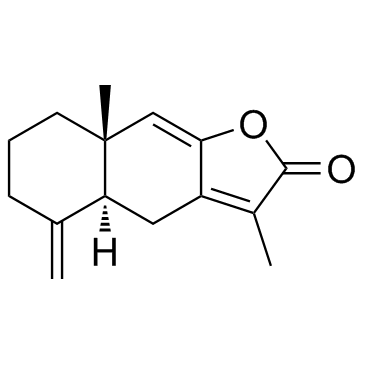Atractylenolide-I sensitizes human ovarian cancer cells to paclitaxel by blocking activation of TLR4/MyD88-dependent pathway.
Jian-Ming Huang, Guo-Nan Zhang, Yu Shi, Xiao Zha, Yi Zhu, Miao-Miao Wang, Qing Lin, Wen Wang, Hai-Yan Lu, Shi-Qi Ma, Jia Cheng, Bi-Fang Deng
文献索引:Sci. Rep. 4 , 3840, (2014)
全文:HTML全文
摘要
Paclitaxel, a known TLR4 ligand, leads to activation of TLR4/MyD88-dependent pathway that mediates chemoresistance and tumor progression in epithelial ovarian carcinoma (EOC). Atractylenolide-I (AO-I), a novel TLR4-antagonizing agent, inhibits TLR4 signaling by interfering with the binding of LPS or paclitaxel to membrane TLR4 of human leukocytes. In this study, AO-I was found to attenuate paclitaxel-induced protein expression of IL-6, VEGF and survivin, and to enhance early apoptosis and growth inhibition in MyD88(+) EOC cells; AO-I was shown to fit into the hydrophobic pocket of human MD-2 and to partially overlap with the binding site of paclitaxel by docking simulations, suggesting that AO-I may block the MD-2-mediated TLR4/MyD88-dependent paclitaxel signaling in MyD88(+) EOC cells. Therefore, AO-I could significantly sensitize the response of MyD88(+) EOC cells to paclitaxel by blocking MD-2-mediated TLR4/MyD88 signaling, and that AO-I-paclitaxel combination could be a promising strategy for the treatment of EOC with a functional TLR4/MyD88/NF-κB pathway.
相关化合物
| 结构式 | 名称/CAS号 | 分子式 | 全部文献 |
|---|---|---|---|
 |
白术内酯I; 苍术内酯I
CAS:73069-13-3 |
C15H18O2 |
|
GABA(A) receptor modulators from Chinese herbal medicines tr...
2012-02-15 [Phytomedicine 19 , 334-340, (2012)] |
|
Quantitative analysis of atractylenolide I in rat plasma by ...
2012-01-01 [J. Pharm. Biomed. Anal. 58 , 172-176, (2012)] |
|
Screening for compounds with aromatase inhibiting activities...
2011-01-01 [Molecules 16 , 3146-3151, (2011)] |
|
Downregulation of matrix metalloproteinase-13 by the root ex...
2011-09-01 [Planta Med. 77 , 1528-1530, (2011)] |